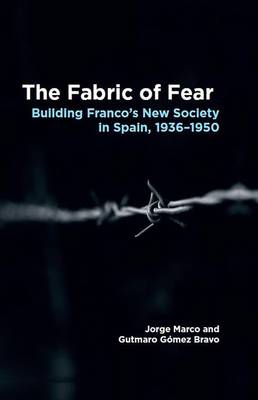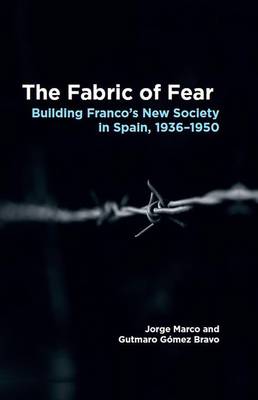
Bedankt voor het vertrouwen het afgelopen jaar! Om jou te bedanken bieden we GRATIS verzending (in België) aan op alles gedurende de hele maand januari.
- Afhalen na 1 uur in een winkel met voorraad
- In januari gratis thuislevering in België
- Ruim aanbod met 7 miljoen producten
Bedankt voor het vertrouwen het afgelopen jaar! Om jou te bedanken bieden we GRATIS verzending (in België) aan op alles gedurende de hele maand januari.
- Afhalen na 1 uur in een winkel met voorraad
- In januari gratis thuislevering in België
- Ruim aanbod met 7 miljoen producten
Zoeken
The Fabric of Fear
Building Franco's New Society in Spain, 1936-1950
Jorge Marco, Gutmaro Gomez Bravo
€ 237,45
+ 474 punten
Omschrijving
The Fabric of Fear deals comprehensively with the process of Francoist state- and nation-building in Spain. Franco's chosen tools were mass repression and 'cleansing', undertaken both during the battlefield war of 1936-39 and in the decade afterwards, when 'war' against defeated constituencies continued by institutional means. Mobilising its grass roots supporters made them complicit in the state's project. The complex process of 'cleansing' and 'conversion' of the political 'enemy' required classifying soldiers from the defeated Republican army and Republican-zone civilians into 'pro-Franco', 'indifferent', or 'internal enemy'. Many of the latter were either extrajudicially murdered or executed after cursory military trials. Classification used ultra-traditionalist Catholic means, including segregation and forced 'conversion'. The new society programme implemented between 1936 and 1950 was applied nation-wide to political activists, members of Republican parties, labour organisations, and (poor) urban and (landless) rural social constituencies. The Francoist project adapted to the changing national and international contexts across the period 1936-1950: from a civil war; through the period of relations with the Axis powers at the same time as receiving Nazi assistance in building up Franco's police force as an agent of repression; to the transformation of Franco into an anti-Communist client of the Cold War West. The Fabric of Fear addresses the social effects of the 'cleansing' process on both 'victors' and 'vanquished'. On the one hand, Franco's violent policy forged a new society and tightened the links between the regime and its social base. On the other hand, the violence and coercion exerted on the 'vanquished' resulted in their civil and legal death: they were expelled from Franco's national community and deprived of all rights in what became de facto an apartheid society in Spain.
Specificaties
Betrokkenen
- Auteur(s):
- Uitgeverij:
Inhoud
- Aantal bladzijden:
- 270
- Taal:
- Engels
- Reeks:
Eigenschappen
- Productcode (EAN):
- 9781789761061
- Verschijningsdatum:
- 5/01/2023
- Uitvoering:
- Hardcover
- Formaat:
- Genaaid
- Afmetingen:
- 150 mm x 224 mm
- Gewicht:
- 498 g

Alleen bij Standaard Boekhandel
+ 474 punten op je klantenkaart van Standaard Boekhandel
Beoordelingen
We publiceren alleen reviews die voldoen aan de voorwaarden voor reviews. Bekijk onze voorwaarden voor reviews.









